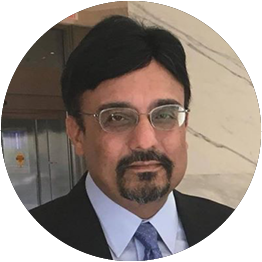
Shahid Sheikh, MD, FCCP

Shahid Sheikh, MD, FCCP
At CHEST 2025, October 19 to 22, in Chicago, practitioners will discover new approaches to revolutionize the way they think about and treat airways diseases.
“The whole concept is to update everyone on what’s going on in real life,” said Shahid Sheikh, MD, FCCP, Chair of the Airways Disease Curriculum Group and the Airways Disorders Network. “Studying clinical issues and clinical problems and developing mechanisms to resolve them—as well as the current research going on in different areas—will inform guidelines so that practitioners can update their approach to care and provide the optimal experience for their patients.”
The airways disease curriculum at CHEST 2025 will keep attendees current on new medications and therapies on the horizon, Dr. Sheikh said. The management of COPD, for example, is seeing an era of revitalization, with emerging guidelines that will change the way practitioners approach management of the disease in different age groups.
In a pro-con debate session, Current Controversies in COPD, international experts will argue the merits and drawbacks of measuring blood eosinophil count, adding dupilumab following an exacerbation to the regimen for patients receiving inhaled triple therapy, and the use of telehealth visits for pulmonary rehabilitation. The core interactive session, The Future of COPD Management, will explore personalized therapeutic approaches, innovative diagnostic tools, and recent breakthroughs—including the use of novel biologics for COPD.
Pediatric pulmonologists will see the latest in emerging research and clinical advancements in conditions like asthma, cystic fibrosis (CF), sickle cell disease, muscular dystrophies, non-CF bronchiectasis, and pediatric sleep disorders. They’ll learn about new medications and gene therapies for their young patients.
CF is not just a pediatric topic, noted Dr. Sheikh. With the advent of genetic sequencing, more and more patients are diagnosed later in life. “Cystic fibrosis transmembrane conductance regulator-modulated gene therapies have come to practice in the last couple of years,” he said.
“They have revolutionized the face of cystic fibrosis treatment because, now, cystic fibrosis, like ciliary dyskinesia and a number of other diseases, is also an adult disease. So, the transition of care and familiarity with current guidelines and new medications are of the utmost importance.” The core interactive session, CF Conundrum: Nondiagnostic Tests and Atypical Presentations, will address gaps in knowledge that can affect prognosis for patients considered “atypical,” according to diagnostic criteria.
The CHEST 2025 program has “something for everyone,” for every career stage and for every member of the pulmonary care team, Dr. Sheikh said. “Advanced practice providers, just like pulmonologists, respiratory therapists, and all other team members, are essential parts of the care process, and our sessions are designed to provide them with education in specific areas so that overall, as a team, we can take care of our patients in a better way.”
CHEST 2025 is essential for every practitioner to stay abreast of the latest clinical guidance, and every session is unique, said Dr. Sheikh. Core interactive sessions, panel discussions, pro-con debates, simulations, problem-based learning sessions, honor lectures, and more create a rich tapestry of offerings that will bring fresh perspectives to every attendee.
“The CHEST Annual Meeting is where you make friends, where you get ideas for your next research projects, and where you find the mentors who will help you achieve your goals,” Dr. Sheikh said. “We can each be part of that process; that’s what it’s all about. We’ll see you soon.”
READ ALL CHEST 2025 BLOGS »